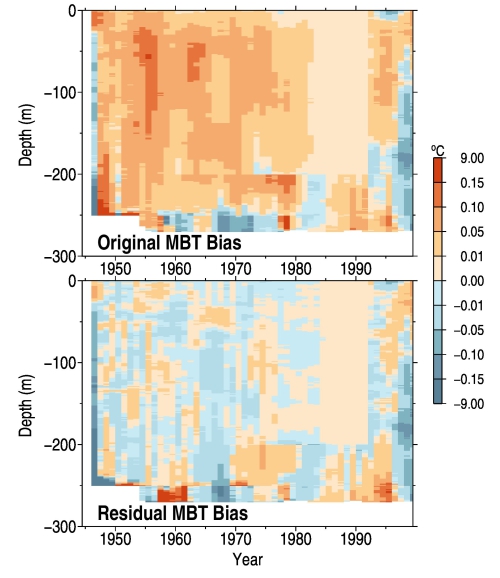A homogeneous, consistent, high-quality in situ temperature data set covering some decades in time is crucial for the detection of climate changes in the ocean.
Systematic errors in the global archive of temperature profiles pose a significant problem for the estimation and monitoring of the global ocean heat content, a most reliable indicator of climate change. During almost four decades between 1940-1970s the majority of temperature observations in the ocean within the upper 200 meters was obtained by means of mechanical bathythermographs (MBT). Actually MBT contributes to 68% of ocean subsurface data within 1940-1966.
The new study by Viktor Gouretski and CHENG Lijing from the Institute for Atmospheric Physics, Beijing, published in theJournal of Atmospheric and Oceanic Technology investigates the quality of MBT data by comparing these data with reference profiles obtained by means of Nansen bottle casts and Conductivity-Temperature-Depth profilers (CTD).

Ocean heat content is a most reliable indicator of climate change. (Image by ZHU Jiang)
This comparison reveals significant systematic errors in MBT data. The MBT temperature bias is as large as 0.2°C before 1980 on the global average and reduces to less than 0.1°C after 1980. To eliminate this bias from the original data a new empirical correction scheme for MBT data is derived, where the MBT correction is country-, depth, and time- dependent.
Several bias correction schemes were tested. In order to objectively assess the performance of the schemes, four metrics were introduced and for each correction scheme and bias reduction factors were calculated. The scheme accounting for the depth bias and the thermal bias showed the best performance significantly reducing the original bias. Further, the new MBT correction scheme suggests a better performance compared with three MBT correction schemes proposed earlier in the literature (from Japan, United States of America and Germany).

Original (upper) and residual (bottom) median MBT temperature bias versus depth and year.(Image by CHENG Lijing)
The reduction of the biases increases the homogeneity of the global ocean database being mostly important for climate change related studies, such as the improved estimation of the ocean heat content changes.
"This new technique will be used in IAP ocean gridded temperature product and ocean heat content estimate in 2020." said CHENG, "We expect it to significantly improve their quality during the 1940-1970 period."
This study is funded by National Key R&D Program (2016YFC1401800 and 2017YFA0603202) and Chinese Academy of Sciences (CAS) President's International Fellowship Initiative (PIFI).
Citation: Gouretski V. and Cheng, L., 2020: Correction for systematic errors in the global data set of temperature profiles from mechanical bathythermographs. J. Atmos. Oceanic Technol., 0, https://doi.org/10.1175/JTECH-D-19-0205.1
Media contact: Ms. LIN Zheng, jennylin@mail.iap.ac.cn
